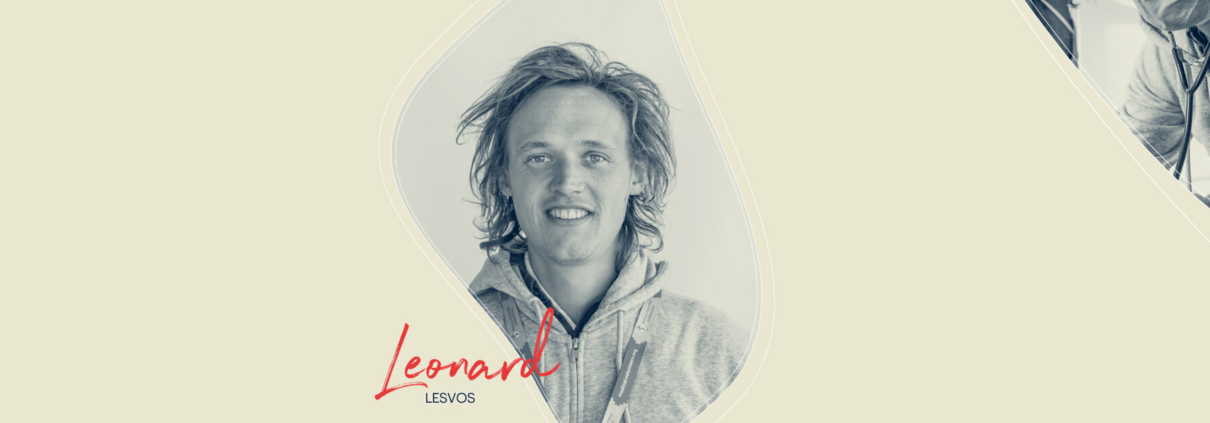“This may sound bizarre: but compared to what I experience here, Lesvos felt almost like a vacation for me as a volunteer doctor.”
Leonard Kirn studied medicine in Berlin and is currently doing his residency in anesthesiology and intensive care medicine. Back when he was still a student, he made the decision to work in humanitarian aid one day. He was always concerned with the situation of people on the move, so he decided to get his own view of the situation on the ground. In March, he was already in Athens with MVI. The experiences there inspired and motivated him to assist in an MVI project again in the fall of 2021.
You spent several weeks as a doctor on Lesbos before you left for Bosnia quite spontaneously. How did the change of location come about?
The situation on Lesvos has changed in the last months: Hardly any refugees are arriving now and several are leaving the camp, so that today there are “only” about two thousand people on the move on Lesvos – at the same time, the network of medical assistance offered by non-governmental organizations (NGOs) has remained relatively stable. This means that not as many doctors are needed as before. Conversely, we have seen that the situation is worsening in Bosnia. The offer of medical assistance for people on the move is significantly lower there – but it is urgently needed. Our advantage as a small, dynamic organization is that we can act quickly and adapt our work to the current situation. In my case, I was basically transferred to Bosnia and left Lesbos by ferry and bus, arriving a few days later in Velika Kladusa.
What were your impressions during your first days in Bosnia?
This may sound bizarre: But compared to what I experience here, Lesvos almost felt like a vacation to me as a volunteer doctor. On Lesvos you have bars, beaches and simply many distractions. Working here is something else. The mental strain is high. The city is a desolate place. It’s cold and barren. I’m usually a very active person, but here I have to force myself to go out at all.
Velika Kladusa is close to the Croatian border and thus the external EU border. You can see the traces of war everywhere. Bombed-out houses and ruins. Unlike on Lesbos, where people on the move arrive in an environment where the majority of locals live in relative prosperity, you can see poverty everywhere – and not just among people on the move. But of course it hits them particularly hard: Most of them live in empty houses and shacks without electricity or heating. They warm themselves with blankets and make fires to keep themselves warm. That’s especially difficult in winter, when the temperatures can sometimes drop below -6 degrees. Seeing the children here, it tears my heart, because you start to think about how some children in Germany are being spoiled in the run-up to Christmas holidays – this makes the contrast even more extrem.
How many people are currently part of the team working in Bosnia?
At the moment we only have a team consisting of the project coordinator, a nurse and me as a doctor here. We are actually on call all around the clock. We even go out at midnight in case there is an emergency. That takes a lot out of you. But MVI only got its registration to work in Bosnia very recently. Unlike the work on Lesvos, it is sometimes more dangerous and difficult for NGOs to work here. Our work is not always welcomed by parts of society and the police. That is why we work undercover as much as possible.
We don’t have a clinic here, as we do on Lesvos. Instead we try to act as tourists. We visit the patients with a backpack full of medicines. We also have a car with which we make some trips. The refugees send us their location via Facebook when they need medical help.
How should one imagine the situation on the ground? What does the life of people on the move look like?
Velika Kladusa is the last stop before the EU border for most of them. A town where they stay and wait for the right moment to make another attempt to cross the border. They call this “The Game”. It sounds a bit irritating to my ears. But I guess it means the game of taking the risk – you never know if you’ll make it or not. Many try to make it by bus or with the help of smugglers. If they are caught, the border guards or policemen take their cell phones, powerbanks and other items. These are destroyed and the people are abandoned somewhere on the other side of the border. Many of them come back to Velika Kladusa after a failed attempt, get the basic necessities of life with the help of NGOs – and then try again from the beginning. We cannot change politics. But we can try to offer people on the move the most basic medical care.





Временная регистрация в Москве
Quality articles is the key to invite the
users to pay a visit the web page, that’s what this website is providing.
Look at my web blog :: http://www.folkd.com